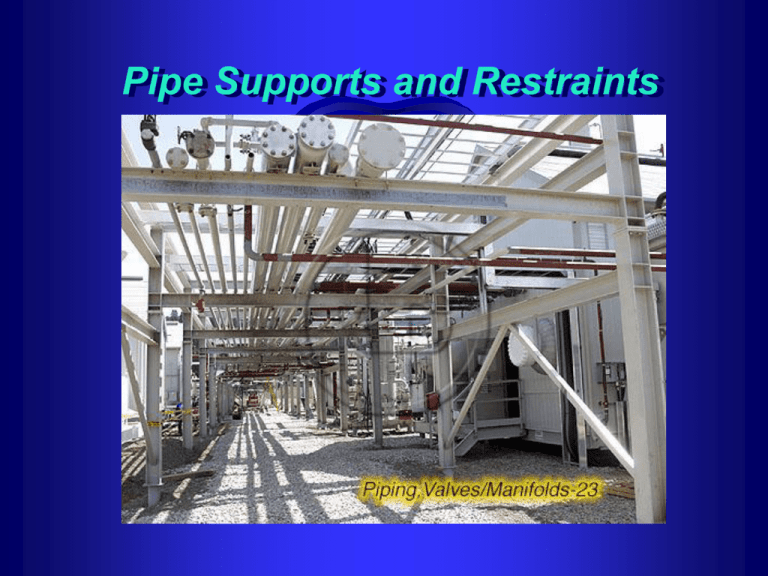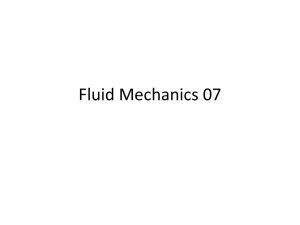Piping and support arrangement
advertisement

Pipe Supports and Restraints Piping components: pipe supports and restraints Function of supports and restraints: – To carry load – To ensure that material is not stressed beyond a safe limit – Holdup of liquid can occurred due to pipe sagging (allow draining) – To permit thermal expansion – To withstand and dampen vibrational forces applied to the piping Piping components: pipe supports and restraints Supports: – Absorb system weight – Reduce: • longitudinal pipe stress • pipe sag • end point reaction loads Piping components: pipe supports and restraints Restraints – Control, limit, redirect thermal movement • Reduce thermal stress • Reduce loads on equipment connections – Absorb imposed loads • Wind • Earthquake • Slug flow • Water hammer • Flow induced-vibration Piping components: pipe supports and restraints Support and Restraint Selection Factors: – – – – – – Weight load Available attachment clearance Availability of structural steel Direction of loads and/or movement Design temperature Vertical thermal movement at supports Piping components: pipe supports and restraints (rigid support) Piping components: pipe supports and restraints (hanger support) Piping components: pipe supports and restraints (flexible support) Rigid hangers are normally used at locations where no vertical movement of the piping occurs. Piping components: pipe supports and restraints (flexible support) Piping components: pipe supports and restraints (flexible support) Flexible Supports Piping components: pipe supports and restraints (flexible support) Piping components: pipe supports and restraints (flexible support) Flexible Supports Piping components: pipe supports and restraints (flexible support) Flexible Supports Piping components: pipe supports and restraints (flexible support) Piping components: pipe supports and restraints (flexible support) Piping components: pipe supports and restraints (anchor, guide) Anchor – Full fixation – Permits very limited (if any) translation or rotation Guide – Permits movement along pipe axis – Prevents lateral movement – May permit pipe rotation Piping components: pipe supports and restraints (Restraints - Anchors) Piping components: pipe supports and restraints (Restraints - Guide) Piping components: pipe supports and restraints (Piping and support arrangement) Piping can be arranged – On piperacks – Near grade on sleeper – In trench – Near steelwork or equipment Piping components: pipe supports and restraints (Piping and support arrangement) Piping components: pipe supports and restraints (Piping and support arrangement) Piping components: pipe supports and restraints (Piping and support arrangement) Piping components: pipe supports and restraints (Piping and support arrangement / support definition) Pipeway: – Is the space allocated for routing several parallel adjacent lines – Group lines in pipeway Piperack – Is a structure in the pipeway for carrying pipes and is usually fabricated from Steel, Concrete & steel, also provide protected location for ancillary equipment (pump, utility station, …) – Piperack shape termed tee-head support Piping components: pipe supports and restraints (Piping and support arrangement / support definition) Piperack consist: – Bent: • Connected shape frame – Stanchion: • The vertical member of bents are termed stanchion Piperack arrangement: – Single deck – Double deck, … Piping components: pipe supports and restraints (Piping and support arrangement) Arrangement of pipe on support: – Usually 2” < NPS < 12” mounted on piperack and larger pipes are mounted on sleeper – Mounted large diameter pipe near stanchion for uniform distribution of load Piping components: pipe supports and restraints (Piping and support arrangement) – Hot pipe usually insulated and mounted on shoes Piping components: pipe supports and restraints (Piping and support arrangement) – Other type of shoes Piping components: pipe supports and restraints (Piping and support arrangement) – Use bracket or outrigger for • Installation of electrical and instrument tray • Pipes with slope Piping components: pipe supports and restraints (Piping and support arrangement) – Group requiring expansion loop at one side of the pipe rack – Design hanger for 2 ½” and larger pipe Piping components: pipe supports and restraints (Piping and support arrangement) – For better stress distribution in the pipe wall, saddle used on large line and used for lines that twist over when moving Piping components: pipe supports and restraints (Piping and support arrangement) – Provide guide for long straight pipes subject to thermal movement Piping components: pipe supports and restraints (Piping and support arrangement) – The smallest size of pipe run on a piperack 2” – If necessary, suspend pipe smaller 2” from 4” and larger – For making horizontal branch, change height of pipe Piping components: pipe supports and restraints (Piping and support arrangement) – The most economic beam section desired for the piperack > 6 ft 20 -25 ft – If more room is needed, make double or triple piperack Piping components: pipe supports and restraints (Piping and support arrangement) – Categorize piperack, for example if using double deck, place utility service piping on the upper level of the piperack Utility service process Determine by lifting equipment required access Piping components: pipe supports and restraints (Piping and support arrangement) – Don’t install pipe on stanchion, this will prevent adding another deck – Consider sufficient space beside piperack 10 ft Piping components: pipe supports and restraints (Piping and support arrangement) – Ensure that nozzles on equipment are free from transmitted by the piping – Equipment suppliers will state max. loading permissible at nozzles Piping components: pipe supports and restraints (Piping and support arrangement) – Dummy leg length Piping components: pipe supports and restraints (Piping and support arrangement) – For line smaller than 2” and non-critical arrange supports in the field – Pocketing of liquid due to sagging can be eliminated by sloping the line so that the difference in height between adjacent supports is at least equal to triple deflection at the midpoint – As a rule of thumb, spans for insulated lines should be reduced by approximately %30 from those for uninsulated pipes Piping components: pipe supports and restraints (Piping and support arrangement) – Support piping from overhead, in preference to underneath – Install flange, with 12” minimum clearance from supporting steel >12” Piping components: pipe supports and restraints (Piping and support arrangement) – Keep weld joints at least 3” from supporting steel or other obstruction >2” – To carry the weight of the piping use a FOS = 3 – In general, one hanger or other support should be specified for each side of a valve. Piping components: pipe supports and restraints (Piping and support arrangement) – Field support • For line smaller than 2” and non-critical, arrange supports in the field – Finding location of support Piping components: pipe supports and restraints (piping support document) Piping components: pipe supports and restraints (piping support document) Piping components: pipe supports and restraints (piping support drawing)





